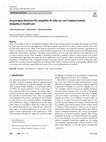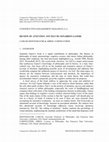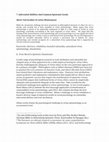Papers by Abrol Fairweather
Knowledge, Dexterity, and Attention
Knowledge, Dexterity, and Attention
Oxford Handbooks Online, 2017
This chapter examines connections between virtue epistemology and psychology. The authors’ intere... more This chapter examines connections between virtue epistemology and psychology. The authors’ interest is thus to explain, understand, and evaluate virtue theoretic forms of epistemic psychology. Section I provides a brief overview of virtue epistemology; section II then discusses the two main types of virtue epistemological theories currently on offer (responsibilism and reliabilism). Section III examines empirical challenges to responsibilism from social psychology (epistemic situationism) and some lines of response. Section IV concludes by showing that a pressing problem for virtue reliabilism, namely providing an adequate account of epistemic agency, can be resolved by utilizing recent empirical work in the psychology of attention. The authors defend an empirically informed account of epistemic agency suitable for virtue reliabilism.

Chapter 1. Introduction: Virtue epistemology meets philosophy of science Abrol Fairweather.- Part... more Chapter 1. Introduction: Virtue epistemology meets philosophy of science Abrol Fairweather.- Part I. Epistemic Virtue, Cognitive Science & Situationism.- Chapter 2. The Function of Perception Peter Graham.- Chapter 3.Metacognition and Intellectual Virtue Chris Lepock.- Chapter 4. Daring to Believe: Epistemic Agency and Reflective Knowledge in Virtue Epistemology Fernando Broncano.- Chapter 5. Success, Minimal Agency and Epistemic Virtue Carlos Montemayor.- Chapter 6. Toward a Eudaimonistic Virtue Epistemology Berit Brogaard.- Chapter 7. The Situationist Challenge to Reliabilism About Inference Mark Alfano.- Chapter 8. Inferential Virtues and Common Epistemic Goods Abrol Fairweather & Carlos Montemayor.- Part II. Epistemic Virtue and Formal Epistemology.- Chapter 9. Curiosity, Belief and Acquaintance Ilhan Inan.- Chapter 10. Epistemic Values and Disinformation Don Fallis.- Chapter 11. Defeasibility without inductivism Juan Comasana.- Part III. Virtues of Theories and Virtues of Theor...
Epistemic Situationism, 2017
This paper is an extended prolepsis in favor of epistemic situationism, the thesis that epistemic... more This paper is an extended prolepsis in favor of epistemic situationism, the thesis that epistemic virtues are not sufficiently widely distributed for a virtue-theoretic constraint on knowledge to apply without leading to skepticism. It deals with four objections to epistemic situation: 1) that virtuous dispositions are not required for knowledge, 2) that the Big Five or Big Six personality model proves that intellectual virtues are a reasonable ideal, 3) that the cognitive-affective personality system framework proves that intellectual virtues are a reasonable ideal, and 4) that weakening the reliability requirement through epistemic dependence or abilism means that common inferential strategies really are virtues. The paper concludes with reflections on the replication crisis in psychological science
Knowledge, Dexterity, and Attention
Thinking Deep About Feeling Low, 2012

AI & SOCIETY
What are the limits of the use of artificial intelligence (AI) in the relational aspects of medic... more What are the limits of the use of artificial intelligence (AI) in the relational aspects of medical and nursing care? There has been a lot of recent work and applications showing the promise and efficiency of AI in clinical medicine, both at the research and treatment levels. Many of the obstacles discussed in the literature are technical in character, regarding how to improve and optimize current practices in clinical medicine and also how to develop better data bases for optimal parameter adjustments and predictive algorithms. This paper argues that there are also in principle obstacles to the application of AI in clinical medicine and care where empathy is important, and that these problems cannot be solved with any of the technical and theoretical approaches that shape the current application of AI in specific areas of clinical medicine in which care for patients is fundamental. This is important, because it generates specific risks that may be overlooked otherwise, and it justifies the necessity of human monitoring and emotional intervention in clinical medicine. Consequently, difficult issues concerning moral and legal responsibility may ensue if these in principle problems are ignored.

Comparative Philosophy: An International Journal of Constructive Engagement of Distinct Approaches toward World Philosophy
Jonardon Ganeri's book is a signal contribution to philosophy. His fluency in philosophy of mind,... more Jonardon Ganeri's book is a signal contribution to philosophy. His fluency in philosophy of mind, epistemology, cognitive science, and classic Indian philosophy, among other traditions, has been previously highlighted (e.g., Arnold 2008; Brooks 2013; Westerhoff 2013). His recent book Attention, Not Self is a major achievement that synthesizes Ganeri's knowledge of philosophy and its history, in a truly intercultural way. Our focus will be on the modular and normative aspects of Ganeri's account of attention, highlighting possible areas of development and additions that would help complete the ambitious project of Attention, Not Self. The main topics we discuss are the relation between consciousness and attention, the importance of agency for normative evaluations, and the type of virtue theory that could best accommodate Ganeri's proposals, given the cognitive architecture he proposes. A brief survey of the book suffices to appreciate the scope and ambition of Attention, Not Self. Ganeri defends a view of the mind in which attention, rather than the self, takes pride of place. Part I, on the priority of attention, surveys and analyzes classical sources in Indian philosophy (especially the work of Buddhaghosa) and compares them with many of the leading contemporary theories in philosophy. Ganeri argues that findings in cognitive science confirm classical Indian views of the mind. One of the main claims of this section is that the "agent-causal" self should play no role in a theory of mind. It remains to be seen if there are costs incurred when accounting for normative evaluation-an issue we explore below. Part II provides an attentional account of knowledge, focused on perceptual attention. We analyze how this attentional account of knowledge addresses issues involving epistemic normativity. Part III, "the calling of attention", further explores the psychology of visual attention, emphasizing the modular architecture of the mind that dispenses with
Knowledge, Dexterity, and Attention
A Theory of Epistemic Agency Contemporary cognitive science clearly tells us that attention is mo... more A Theory of Epistemic Agency Contemporary cognitive science clearly tells us that attention is modulated for speech and action. While these forms of goal-directed attention are very well researched in psychology, they have not been sufficiently studied by epistemologists. In this book, Abrol Fairweather and Carlos Montemayor develop and defend a theory of epistemic achievements that requires the manifestation of cognitive agency. They examine empirical work on the psychology of attention and assertion, and use it to ground a normative theory of epistemic achievements and virtues. The resulting study is the first sustained naturalized virtue epistemology, and will be of interest to readers in epistemology, cognitive science, and beyond. on this title

While the situationist challenge has been prominent in philosophical literature in ethics for ove... more While the situationist challenge has been prominent in philosophical literature in ethics for over a decade, only recently has it been extended to virtue epistemology (See also forthcoming work on this issue by Doris and Olin, Heather Battaly, Christian Miller in Naturalizing Epistemic Virtue. (Fairweather & Flanagan eds.)). Mark Alfano argues that virtue epistemology is shown to be empirically inadequate in light of a wide range of results in social psychology, essentially succumbing to the same argument as virtue ethics. We argue that this meeting of the twain between virtue epistemology and social psychology in no way signals the end of virtue epistemology, but is rather a boon to naturalized virtue epistemology. We use Gird Gigerenzer’s models for bounded rationality (2011) to present a persuasive line of defense for virtue epistemology, and consider prospects for a naturalized virtue epistemology that is supported by current research in psychology.
Oxford Bibliographies Online Datasets, 2000
Virtue Epistemology Naturalized, 2014
Naturalizing Epistemic Virtue, 2014
Virtue Epistemology Naturalized, 2014
While the situationist challenge has been prominent in philosophical literature in ethics for ove... more While the situationist challenge has been prominent in philosophical literature in ethics for over a decade, only recently has it been extended to virtue epistemology 1. Alfano argues that virtue epistemology is shown to be empirically inadequate in light of a wide range of results in social psychology, essentially succumbing to the same argument as virtue ethics. We argue that this meeting of the twain between virtue epistemology and social psychology in no way signals the end of virtue epistemology, but is rather a boon to naturalized virtue epistemology. We use Gird Gigerenzer's models for bounded rationality (2011) to present a persuasive line of defense for virtue epistemology, and consider prospects for a naturalized virtue epistemology that is supported by current research in psychology.
The Duhem-Quine Thesis is the claim that it is impossible to test a scientific hypothesis in isol... more The Duhem-Quine Thesis is the claim that it is impossible to test a scientific hypothesis in isolation because any empirical test requires assuming the truth of one or more auxiliary hypotheses. This is taken by many philosophers, and is assumed here, to support the further thesis that theory choice is underdetermined by empirical evidence. This inquiry is focused strictly on the axiological commitments engendered in solutions to underdetermination, specifically those of Pierre Duhem and WV Quine. Duhem resolves ...











Uploads
Papers by Abrol Fairweather